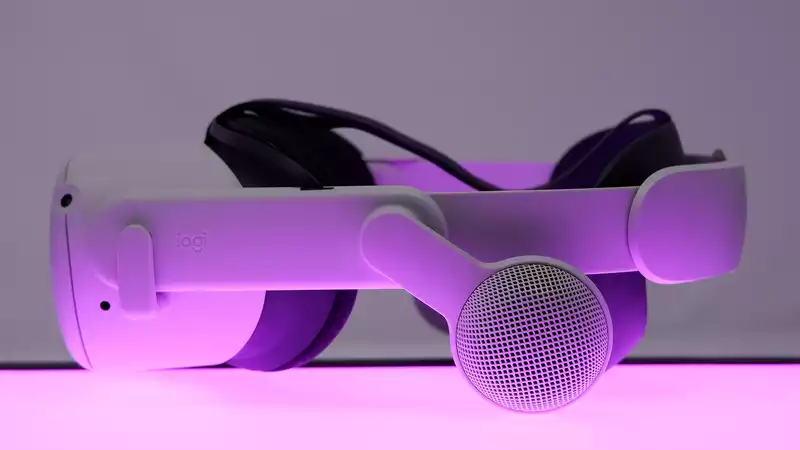An often overlooked element for a great VR experience is the quality of the audio. If it weren't for the Valve Index (opens in new tab), I wouldn't feel so strongly about this; the Valve Index introduced me to excellent VR audio that can trick the brain into thinking it is somewhere else. The problem is that I don't own Valve Index. I own Meta Quest 2 and have been trying to find the best way to mimic Index ever since I got it.
Logitech Chorus is the best way to do that so far.
The Quest 2's default audio solution leaves something to be desired. I can see why it wasn't at the top of my priority list for an entry-level headset. However, we often wish for a little more oomph in the audio department, and while the Quest 2's two small speakers do a reasonable job of blasting audio into your ears while wearing the headset, clarity, bass, and sound insulation are not very high. They also do not particularly support high volume. This takes away from the virtual reality experience.
The obvious solution is to connect headphones; the Quest 2 has a standard 3.5mm port, so most headphones can be plugged right in; I don't have any made with a particularly short cable for the Quest 2, but I have a pair of SteelSeries Arctis Pro Wireless headphones, which I have for calls. I just have to deal with the mess of cables when attaching and detaching the headset.
The headphones are decent enough, but not a perfect fit for the VR experience; VR should bring a more tailored audio experience to reflect the 3D world that surrounds you when wearing the headset.
That's why I always come back to the Valve Index audio solution: two off-ear BMR drivers designed to fully envelop the wearer's ears with audio, yet maintain long-term comfort. These two goals are very well achieved. Audio is loud and clear, and the open-back design provides an expansive soundstage for directional audio. There is a clear separation between you and the driver, but the sound isolation aspect is also surprisingly good.
The Logitech Chorus is an appropriate form factor for the Quest 2 and is a nearly exact replica of the Index audio solution. The Chorus also features two off-ear, open-back BMR drivers that almost perfectly mimic the audio characteristics that inspired it.
This is a really simple audio solution, and it works exactly as I had hoped. The sound quality is excellent and provides an immersive audio experience that was not possible with my headphones. It also produces much louder sound than the built-in speakers.
Installation is simple, and the Chorus secures easily and securely to the Quest 2's frame. It works relatively well with the straps attached to the headset, which clip onto two sturdy arms attached to the headset itself. It worked fine with my Elite strap, and of course can be used with standard fabric straps. Of course, it can also be used with standard fabric straps. Third-party straps with a similar design principle to this should be compatible as well. Just plug the compact USB Type cable into the headset and you are ready to go.
The shorter USB Type-C connection also means no more tangled cables with Chorus. Although it occupies the headset's only USB Type-C port, Chorus provides USB passthrough so you can connect a line to your PC for Oculus Link or to charge the headset easily.
At $100/£90, Chorus is priced comparable to an entirely new headset, and admittedly its use is quite limited. It's easy to see the Quest 2 as a cheaper option than many other high-end PC VR headsets, such as the Valve Index, but if you want to assemble a more comfortable and impressive VR experience with the Quest 2, you'll have to spend a lot.
My VR headset setup includes a $100 Logitech Chorus, a $60 Elite Strap, and an $80 Link Cable. If I were to purchase the Quest 2 today at the new price of $400, I would be out $640.
Admittedly, it's not the $999 that Valve is asking for the Index, but it all adds up. The entry level Quest 2, with a few, in my opinion, must-have accessories, could quickly become expensive overall.
In my opinion, a more comfortable strap is a must-have.
However, the Logitech Chorus sounds perfect to me. It is exactly what I was looking for in an audio upgrade for the Quest 2, providing me with all-around immersive audio that in my opinion rivals the best on the market. If you are looking for a similar upgrade, or are fed up with tangled cables, the Chorus is well worth considering.
.

Comments